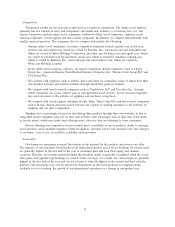Orbitz 2010 Annual Report Download - page 21
Download and view the complete annual report
Please find page 21 of the 2010 Orbitz annual report below. You can navigate through the pages in the report by either clicking on the pages listed below, or by using the keyword search tool below to find specific information within the annual report.dependent on Travelport for our GDS services” below. The limitations imposed by the GDS service agreement
may place us at a competitive disadvantage and could negatively impact our business and results of operations.
Our business and financial performance could be negatively impacted by adverse tax events.
New sales, use, occupancy or other tax laws, statutes, rules, regulations or ordinances could be enacted at
any time. Such enactments could adversely affect our domestic and international business operations and our
business and financial performance. Further, existing tax laws, statutes, rules, regulations or ordinances could
be interpreted, changed, modified or applied adversely to us. These events could require us to pay additional
tax amounts on a prospective or retroactive basis, as well as require us to pay fees, penalties and/or interest for
past amounts deemed to be due. In addition, our revenue may decline because we could have to charge more
for our products and services.
New, changed, modified or newly interpreted or applied tax laws could also increase our compliance,
operating and other costs, as well as the costs of our products or services. Further, these events could decrease
the capital we have available to operate our business. Any or all of these events could adversely impact our
business and financial performance.
We also have a $37 million receivable included in our consolidated balance sheets at December 31, 2009
and December 31, 2008 related to amounts due to us from Cendant (now Avis Budget Group, Inc.) for a
portion of the tax sharing liability with the Founding Airlines. Cendant is obligated to pay us this amount
when it receives the tax benefit. If we were, in the future, to determine that all or a portion of this receivable
is not collectable, the portion of this receivable that was no longer deemed collectable would be charged to
expense in our consolidated statements of operations.
We and others in the online travel industry are currently subject to various lawsuits related to hotel
occupancy tax in numerous jurisdictions in the U.S., and other jurisdictions may be considering similar
lawsuits. An adverse ruling in the existing hotel occupancy tax cases could require us to pay tax retroactively
and prospectively, and possibly penalties, interest and/or fees. We have also been contacted by several
municipalities or other taxing bodies concerning our possible obligation with respect to local hotel occupancy
or related taxes, and certain municipalities have begun audit proceedings and some have issued assessments
against the Company. If the Company is found to be subject to the hotel occupancy tax ordinance by a taxing
authority and appeals the decision in court, certain jurisdictions may attempt to require us to provide financial
security or pay the assessment in order to challenge the tax assessment in court. The proliferation of new hotel
occupancy tax cases or audit proceedings could result in substantial additional defense costs. These events
could also adversely impact our business and financial performance (see Item 3, “Legal Proceedings”).
Our businesses are highly regulated, and any failure to comply with such regulations or any changes in
such regulations could adversely affect us.
We operate in a highly regulated industry both in the U.S. and internationally. Our business, financial
condition and results of operations could be adversely affected by unfavorable changes in or the enactment of
new laws, rules and regulations applicable to us, which could decrease demand for our products and services,
increase costs or subject us to additional liabilities. Moreover, regulatory authorities have relatively broad
discretion to grant, renew and revoke licenses and approvals and to implement regulations. Accordingly, these
regulatory authorities could prevent or temporarily suspend us from carrying on some or all of our activities or
otherwise penalize us if our practices were found not to comply with the then current regulatory or licensing
requirements or any interpretation of such requirements by the regulatory authority. Our failure to comply with
any of these requirements or interpretations could have a material adverse effect on our operations. In addition,
the various regulatory regimes to which we are subject may conflict so that compliance with the regulatory
requirements in one jurisdiction may create regulatory issues in another.
Our business is subject to laws and regulations relating to our revenue generating and marketing activities,
including those prohibiting unfair and deceptive advertising or practices. Our travel services are subject to
regulation and laws governing the offer of travel products and services, including laws requiring us to register
as a “seller of travel” in various jurisdictions and to comply with certain disclosure requirements. As an OTC
21
























